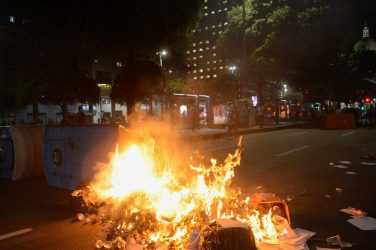Brazil’s President Michel Temer says nothing will destroy him, as he faces suspension and a possible impeachment.
On Monday, Temer became the nation’s first sitting president to be charged with graft and is now awaiting a final decision by the Supreme Court.
Attorney General Rodrigo Janot formally accused President Michel Temer and his aide Rodrigo Rocha Loures of corruption, charging them with receiving bribes from the head of the meatpacking giant JBS.
Criminal charges against a sitting president have to be approved by two-thirds of the lower house of Congress. A total of 341 out of the 513 lawmakers would have to vote in favor. Only then can the Supreme Court issue a conviction.
If approved by the lower house, Temer could be suspended for 90 days while awaiting impeachment proceedings.
In that scenario, the current House Speaker Rodrigo Maia would assume the presidency.
Temer, who was one of the main architects of a similar procedure against former the President Dilma Rousseff, has said he will not resign.
Just a few hours before the prosecutor’s office decision was confirmed, Temer said, “Nothing will destroy us, neither me nor my ministers.”
The president, eight of his ministers and other political allies and advisers are being investigated for alleged corruption in the country’s largest bribery scheme investigation called Operation Car Wash.
In May, a wiretapped conversation with businessman Joesley Batista, chairman of JBS, the largest meatpacking company in the country was released which appeared to show Temer endorsing bribes to potential witnesses in the investigation.
In the recording, Temer was heard saying after being informed that hush money was being paid to the former head of the lower house, Eduardo Cunha, “Look, you’ve got to keep that up.”
Police alleged they had evidence against the president and confirmed the authenticity of the recordings, which Temer insists have been tampered with.
Temer also denied a report in a national magazine claiming that the country’s secret security service, known as Abin, spied on the judge in charge of the same corruption probe.
The president’s support has plummeted as he also faces protests against austerity measures. A survey by the DataFolha polling institute shows just 7 percent of those questioned approved of his administration, down from 9 percent in April.
Meanwhile, former Brazilian President Luiz Inácio Lula da Silva would win the 2018 presidential election, although his candidacy is not yet official, according to the DataFolha Institute.
Lula from the Workers’ Party maintains a leadership between 29 and 30 percent of the vote intention, followed by Marina Silva from Rede Sustainability and Jair Bolsonaro from the Social Christian Party.
teleSUR




